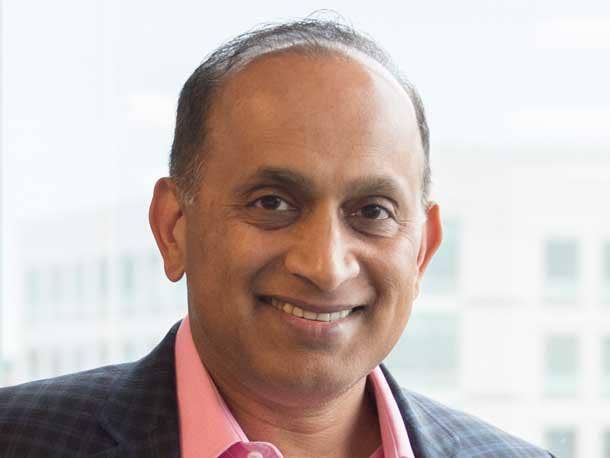Cohesity, Google Cloud Team Up For Vertex AI Data Protection
Cohesity is teaming with Google to apply Google’s generative AI platform Vertex AI to solve the complexity of managing and protecting data by making it easy to quickly search for specific types of data or find anomalies in massive data stores across on-premises, cloud, and edge environments.

Sanjay Poonen
Data security and protection technology developer Cohesity Tuesday unveiled a partnership with Google Cloud under which the two are developing technology based on Vertex AI to gain improved insights on data protected by Cohesity.
The new relationship, which is an extension of the new Cohesity Turing set of AI technologies aimed at data security and management, will give businesses the ability to do things like do fast searches across exabytes of data stored in the Google cloud understand data patterns to find potential threats, recover data, or find answers to specific questions.
Business data continues to grow uncontrollably, leading to the need for new ways to manage and protect that data, said Sanjay Poonen, CEO and president of San Jose, Calif.-based Cohesity.
[Related: Cohesity CEO Sanjay Poonen: Storage And Security Are Now A ‘Blended Conversation’ ]
Data protection technology developers like Cohesity take the feeds from trillions of signals from data in multiple locations to scan for sleeper cell malware and other issues, Poonen told CRN. Cohesity’s DataHawk ransomware protection software, for instance, takes AI-generated feeds from companies like Google and applies AI and machine learning to find issues, he said.
Starting this week, Cohesity and Google Cloud are taking this a step further to use AI to more quickly find data issues and to search data more quickly that traditional methods, Poonen said.
The two are taking advantage of what Poonen called Cohesity’s unique data indexing system that allows data, which is usually stored in a compressed and deduplicated manner in order to save space, to be searched using the data without having to “rehydrate” it.
“With generative AI, we have a platform unique to us,” he said. “Nobody else in the industry, even among the modern [data protection] players, has built a richly indexed system that’s hydrated and elastic searchable. That’s something Mohit Aron, the founder of Cohesity, built. Now add Vertex AI, Google’s generative AI capabilities on top of that, and you’re able to summarize searches in a half-page or one-page document.”
The new Cohesity/Google platform is what Poonen termed “responsible AI.”
“We’re not trying to ask the computer, ‘Are you sentient? What’s the meaning of life?’” he said. “It’s your data, in your tenant, on-prem or in the cloud, and you’re asking questions on that data. So it’s very confined. We feel that whole notion of responsibility is very important. I know it’s important to Google. And when I explained that to [Google], they immediately opened up their engineers and their teams to work with us.”
The new platform is still in the prototype stage, and is expected to be released soon, Poonen said. Cohesity has also taken out patents for the technology, he said.
Kevin Ichhpurani, corporate vice president for Google Cloud, told CRN that the joint project underscores the unique capabilities the two have together with their ecosystem to co-innovate and create capabilities that were fundamentally not possible before.
“Whether it’s the ability to search logs to look for abnormalities and summarize those with a natural language interface, or to have a natural language interface to the metadata of the backups, these were things that were fundamentally not possible without the two companies coming together,” Ichhpurani said. “And our approach is very much building an ecosystem that we co-innovate with.”
Google has been working with generative AI for years, and has both its Bard model on the consumer side and Vertex on the enterprise side, Ichhpurani said. And on the enterprise side, generative AI is working with serious issues, he said.
“For example, enterprises can’t afford, when dealing with clinical trials or security use cases like Sanjay laid out, to have any kind of hallucination,” he said. “Price performance becomes very important. The most important thing is the privacy of the data. And your data does not get commingled with our large language model. ... We keep customer data completely firewalled off in their own Google Cloud tenant, stored locally and encrypted. And it does not get commingled with the model.”
While Vertex AI is a powerful tool, Google needs to work closely with partners like Cohesity to leverage its models and allow customers to adapt the models for their specific, proprietary corpus of data, Ichhpurani said.
“The use cases that Sanjay described earlier are a perfect example of how you’re able to create completely new capabilities,” he said. “We could never do this on our own. We can deliver this together with the ecosystem. And whether it’s the security use cases or the analytics use cases that Sanjay described, or working in pharmaceuticals [or other healthcare areas], … all of these areas are where you really get that one plus one equals three effect working together with the ecosystem.”
Cohesity and Google do not have an exclusive relationship.
Ichhpurani said Google is offering a ubiquitous model that many other companies could be doing many things with, but Google has not made announcements with companies similar to Cohesity.
Poonen said Cohesity also does not approach the relationship expecting exclusivity.
“What we have to do on our side is make sure that the innovation is unique,” he said. “And that’s why we filed a patent, because we think we’re the first to do it. We filed multiple patents because this is new. … Imitation is the best form of flattery. That’s fine. We think we’ve got a head start because it’s not just Vertex AI and generative AI. You have to have the underlying indices.”